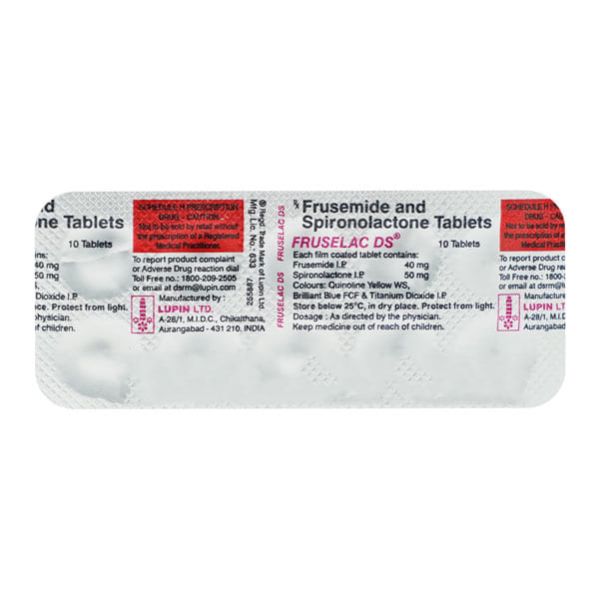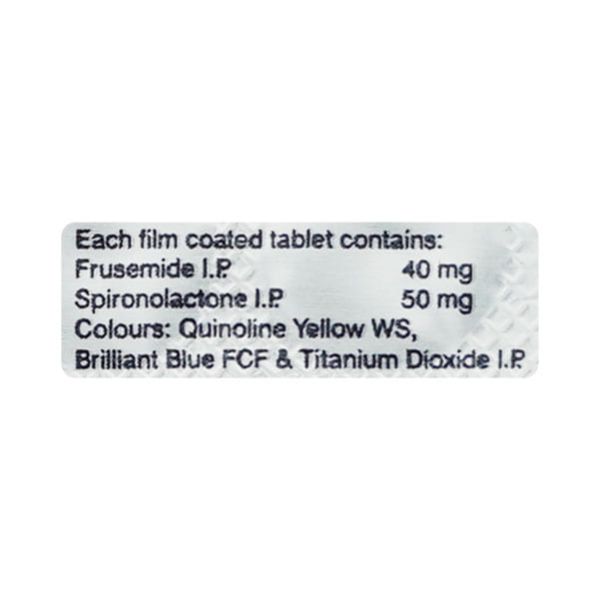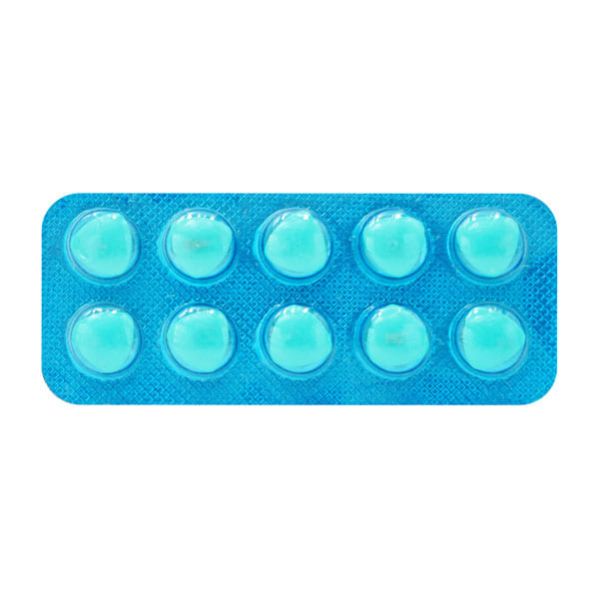Fruselac DS Tablet 10'S
FRUSEMIDE 40MG+SPIRONOLACTONE 50MG
₹ 53.00
₹59
(Inclusive of all taxes)
-

No Warranty
-

COD Avilable
-

Non Returnable
-

cancelable
About this item
INTRODUCTION
FRUSELAC is a combination of Spironolactone and Frusemide which belongs to the group of medicines called Diuretics. It helps to reduce fluid build-up (edema) in the body. Edema is a type of swelling or puffiness of body parts caused due to excessive accumulation of fluid (water) in the body. These extra fluids can cause swollen ankles, shortness of breath and can make you feel more tired than usual. It can also put extra strain on your heart, blood vessels, lungs, kidneys, or liver.
Spironolactone is a potassium sparing diuretic and frusemide is a loop diuretic. They act by removing the excess water and certain electrolytes (sodium and chloride) from the body in the form of urine. Unlike other diuretics, FRUSELAC retains potassium in the body which prevents the risk of developing hypokalaemia (low blood potassium levels).
Before taking FRUSELAC inform your doctor if you have any liver, kidney, or heart problems. You must also inform your doctor if you are severely dehydrated or have diabetes, gout, prostate problems, or low blood pressure which makes you feel dizzy while standing up or changing position.
During management with FRUSELAC, avoid consuming potassium rich diet or potassium supplements, as it may further increase the levels of potassium in your body.
FRUSELAC is not recommended for use in patients with severe low sodium levels in their blood. It is also not suitable for use in pregnant or breastfeeding women due to increased risk of side effects.
FRUSELAC may alters the levels of electrolytes in your body and may make you feel dizzy or tired very easily. To avoid this, your doctor would closely monitor your serum electrolyte levels and increase or decrease the dose of FRUSELAC accordingly.
The most common side effects of [GBKEYWORD] are headache, dizziness, nausea, vomiting, tiredness, muscle weakness, increased urination, or impotence. Consult your doctor if any of the side effect bothers you.
USES OF FRUSELAC
- Manages edema (fluid retention)
HOW FRUSELAC WORKS
FRUSELAC acts by removing the excess water and certain electrolytes (sodium and chloride) from the body in the form of urine while simultaneously maintaining the levels of potassium in the body.
DIRECTIONS FOR USE
Take FRUSELAC as advised by your physician. Swallow the medicine with a glass of water. Do not crush or chew the medicine. It is taken preferably with meals. Your doctor will decide the correct dose and duration of therapy for you depending upon your age, body weight and disease condition. Avoid taking FRUSELAC at night as it could affect your sleep. Do not stop taking FRUSELAC unless your doctor tells you to stop.
SIDE EFFECTS OF FRUSELAC
COMMON
- headache, dizziness
- nausea, vomiting
- general weakness
- increased urination
- excessive thirst
- impotence, reduced sex drive
- breast enlargement in men
- sensation of tingling and numbness
UNCOMMON
- loss of bladder control
- loss of hearing
- leg cramps
RARE
- ringing in the ears
- inflammation of blood vessels
Stop taking FRUSELAC and contact your doctor immediately if you experience any of the following side effects:
- signs of allergic reaction (such as skin rash, itching severe blistering of the skin around the lips, eyes, mouth, nose and genitals, skin sensitivity, fever, swollen ankles, inflammation of the kidneys, shock, cold or pale skin, difficulty in breathing, fast heartbeat)
- signs of pancreatitis (such as severe stomach pain or back pain)
- increased infections and tendency to bruise more easily, feeling weak or tired more than usual
- signs of dehydration (such as excessive thirst, feeling dizzy or light-headed, fainting, headache, confusion, joint pains, muscle weakness or spasms, stomach upsets or uneven heartbeats)
- signs of liver problems (such as yellowing of the skin or eyes, dark urine)
- feeling dizzy or faint
HOW TO MANAGE SIDE EFFECTS
Nausea and Vomiting:
Take FRUSELAC with or just after meals. Stick to simple meals. Avoid eating oil rich or spicy foods. Consult your doctor if your nausea worsens.
Headache:
Rest and relax. Keep yourself hydrated by drinking plenty of fluids such as water or electrolytes. Applying a pain-relieving balm on your forehead can be beneficial. Do not consume excessive alcohol, as it could aggravate your headache. Consult your doctor if your headache worsens.
Dizziness:
Try to rest and relax. Get enough sleep. Avoid driving or operating any tools or machines completely if you feel dizzy. Do not consume excessive alcohol, as it could aggravate your dizziness. Consult your doctor if your dizziness worsens.
WARNING & PRECAUTIONS
PREGNANCY
FRUSELAC is generally not recommended for use in pregnant women. However, consult your doctor before taking it.
BREASTFEEDING
FRUSELAC is generally not recommended for use in breastfeeding women. However, consult your doctor before taking it.
DRIVING AND USING MACHINES
Do not drive or operate any machines if you feel dizzy or unwell after taking FRUSELAC.
ALCOHOL
Avoid consumption of alcohol while taking FRUSELAC as it might make you feel more dizzy.
KIDNEY
FRUSELAC is not recommended for use in patients with severe kidney diseases. It should be used with caution in patients with other minor kidney problems. Therefore, consult your doctor before taking it.
LIVER
FRUSELAC is not recommended for use in patients with severe liver diseases. It should be used with caution in patients with other minor liver problems. Therefore, consult your doctor before taking it.
ALLERGY
Do not take FRUSELAC if you are allergic to Frusemide, Spironolactone, or sulphonamides (Ex. sulfadiazine).
HEART DISEASE
FRUSELAC should be used with caution in patients with heart diseases (such as low blood pressure). Therefore, consult your doctor before taking it.
OTHERS
FRUSELAC is not recommended for use if you:
- have a low blood volume (hypovolemia) or severely dehydrated
- pass scanty urine or no urine at all
- have low or high levels of sodium or potassium in the blood
- have Addison's disease (problems with adrenal glands)
Before taking [GBNKEYWORD inform your doctor if you:
- feel dizzy upon standing up or changing position
- have diabetes
- have difficulty in passing urine
- have prostate cancer or other problems in prostate
- have gout
Use in pediatrics:
FRUSELAC is generally not recommended for use in children and adolescents (aged below 18 years). Therefore, consult your doctor before taking it.
Use in geriatrics:
FRUSELAC should be used with caution in elderly people (aged above 65 years) especially in patients undergoing management for mental illness. Therefore, consult your doctor before taking it.
INTERACTIONS
A. Drug-Drug Interaction:
Before taking FRUSELAC, inform your doctor if you are taking any of the following medicines such as:
- medicines that can change the amount of potassium in your blood such as potassium supplements (Ex. potassium chloride) or potassium sparing diuretics (Ex. triamterene and amiloride)
- medicines used to control elevated blood pressure (such as losartan, candesartan, irbesartan, ramipril, enalapril, perindopril)
- medicines used for relaxing muscles during surgery (Ex. vecuronium and rocuronium)
- medicines used to manage diabetes (Ex. metformin, glimepiride)
- theophylline (a medicine used for asthma)
- phenytoin, carbamazepine (medicines used to manage fits or epilepsy)
- lithium, risperidone (medicines used for mental illnesses)
- medicines used to manage certain forms of cancer (Ex. cisplatin, aminoglutethimide, abiraterone)
- digoxin (a medicine used to manage abnormal heart rate)
- non-steroidal anti-inflammatory drugs (used for pain relief) such as indomethacin, aspirin, ibuprofen, or ketoprofen
- ciclosporin (a medicine used to prevent graft rejection)
- methotrexate (a medicine used for skin cancer, arthritis, or bowel diseases)
- carbenoxolone (used to manage ulcers of the food-pipe)
- corticosteroids (used to manage inflammation) Ex. prednisolone
- probenecid (a medicine used to manage gout)
- cholestyramine (a medicine used to control blood cholesterol levels
- medicines used to manage bacterial infections (Ex. trimethoprim, sulfamethoxazole, ceftriaxone, cefazolin, gentamycin, streptomycin, amikacin, neomycin, netilmicin, tobramycin, vancomycin)
- bendroflumethiazide (another diuretic used to manage edema)
- medicines used as injections before X-ray examinations (Ex. iodine)
- medicines used to manage asthma (such as salbutamol, terbutaline, salmeterol, formoterol or bambuterol)
- reboxetine (a medicine used to manage depression)
- amphotericin (a medicine used to manage fungal infections)
- medicines used to manage constipation such as laxatives (Ex. bisacodyl, Senna)
- liquorice (a medicine used in cough preparations)
Overdosage:
If you or anyone else accidentally took more FRUSELAC, consult your doctor immediately. Symptoms of overdosage might include increased thirst, dryness of mouth, muscle pain or cramps, nausea or vomiting, weak or uneven heartbeat, feeling dizzy, weak or sleepy.
SYNOPSIS
| Drug | : |
Spironolactone, Frusemide |
| Pharmacological Category | : |
Potassium sparing diuretics, Loop diuretics |
| Therapeutic Indication | : |
Edema (fluid retention) |
| Dosage Forms | : |
Tablet |
MORE INFORMATION
- Keep FRUSELAC out of reach of children
- Store FRUSELAC at room temperature
0 Review Of Product Fruselac DS Tablet 10'S















